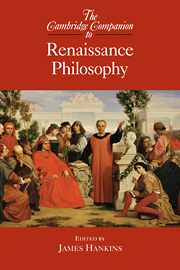Book contents
- Frontmatter
- 1 Introduction
- Part I Continuity and Revival
- Part II Toward Modern Philosophy
- 9 Nicholas of Cusa and modern philosophy
- 10 Lorenzo Valla and the rise of humanist dialectic
- 11 The immortality of the soul
- 12 Philosophy and the crisis of religion
- 13 Hispanic scholastic philosophy
- 14 New visions of the cosmos
- 15 Organizations of knowledge
- 16 Humanistic and scholastic ethics
- 17 The problem of the prince
- 18 The significance of Renaissance philosophy
- Appendix: Brief biographies of Renaissance philosophers
- Bibliography
- Index
17 - The problem of the prince
from Part II - Toward Modern Philosophy
Published online by Cambridge University Press: 28 November 2007
- Frontmatter
- 1 Introduction
- Part I Continuity and Revival
- Part II Toward Modern Philosophy
- 9 Nicholas of Cusa and modern philosophy
- 10 Lorenzo Valla and the rise of humanist dialectic
- 11 The immortality of the soul
- 12 Philosophy and the crisis of religion
- 13 Hispanic scholastic philosophy
- 14 New visions of the cosmos
- 15 Organizations of knowledge
- 16 Humanistic and scholastic ethics
- 17 The problem of the prince
- 18 The significance of Renaissance philosophy
- Appendix: Brief biographies of Renaissance philosophers
- Bibliography
- Index
Summary
The Renaissance occupies a paradoxical place in the history of political thought. It is famous for having nurtured two diametrically opposed, although similarly extreme theoretical positions: republicanism and absolutism. Yet neither position was remotely characteristic of Renaissance political theory as a whole. The result is an understandable, but nonetheless unfortunate skewing of the literature on Renaissance political philosophy. Because republicanism and absolutism are taken to be the signal theoretical contributions of the period, and because these ideologies tend to be of most interest to contemporary scholars, they receive a disproportionate amount of attention in chapters such as this one. In contrast, the overwhelmingly dominant political ideology of the age, which might be described as princely humanism, tends to be obscured by its more celebrated, but far less ubiquitous rivals. To put the matter a bit differently, the reader of most surveys of Renaissance political thought could be forgiven for concluding that, when taken together, republicanism and absolutism accounted for close to 90 percent of published Renaissance political writings. The truth of the matter, however, is quite the reverse: taken together, these two ideologies probably accounted for less than 10 percent of the political literature of the period. The analysis which follows aims to take seriously the dominance of princely humanism in Renaissance political thought, while at the same time explaining how the various tensions within it inspired important republican and absolutist critiques.
- Type
- Chapter
- Information
- The Cambridge Companion to Renaissance Philosophy , pp. 319 - 337Publisher: Cambridge University PressPrint publication year: 2007
- 1
- Cited by

